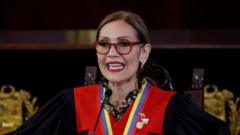Venezuela’s highest court has upheld the reelection of Nicolás Maduro as president following accusations of widespread voter fraud.
The decision by the Supreme Tribunal of Justice (TSJ) comes as the United Nations warned that the court lacked independence and impartiality.
Marta Valiñas, chair of the fact-finding mission organised by the UN Human Rights Council, said the government had “exerted undue influence over TSJ decisions” through the use of “direct messages to judges and public statements”.
The TSJ said it had reviewed material from the country’s election authority, which said Mr Maduro had won just over half of the vote, and agreed he had been victorious.
Caryslia Rodríguez, the court’s president, said: “The electoral material assessed is certified unobjectionably and the results of the presidential election of July 28 released by the National Electoral Council (CNE), where Nicolas Maduro was elected president of the republic, are validated.” The decision could not be appealed, she said.
Francisco Cox Vial, another member of the UN’s fact-finding mission, said Ms Rodríguez was a member of Mr Maduro’s ruling party and had held elected positions within it.
Mr Maduro has led the country since 2013 and his reelection means he can serve another six-year term.
At least 23 protesters have been killed at anti-government demonstrations since last month’s election and approximately 2,400 more have been arrested, the UN says.
Protests erupted after the CNE declared Mr Maduro the winner on election night without publishing detailed voting tallies.
Patricia Tappatá Valdez, a member of the UN fact-finding mission, said: “The current president of the CNE, Elvis Amoroso, served as a member of the National Assembly for the ruling party.” The National Assembly is Venezuela’s legislature.
The opposition says the tallies prove that its candidate, Edmundo González, won comfortably and they have published copies collected by their election observers on the internet.
These documents, which have been reviewed by independent experts and media, suggest Mr González won 67% of the vote compared to Mr Maduro’s 30%.
Several Western countries have urged the Venezuelan authorities to publish the voting tallies in full while others, including Russia and China, have congratulated Mr Maduro on his victory.
As well as the deaths and arrests of protesters in the last few weeks, the Maduro government has also started an investigation into opposition leaders for allegedly inciting the country’s military to commit crimes.
They have also started passing a law through the National Assembly which would tighten rules on non-governmental organisations and forced the resignations of state employees who allegedly declared pro-opposition views.
The presidential contest in 2018 was widely dismissed as neither free nor fair after opposition candidates were jailed, barred from running or forced into exile.
“You have to be very careful nowadays who you are talking to, what you’re saying to people around you,” Dina tells the BBC World Service. “They can ask you for your phone, if they see something that they consider suspicious you can go to prison.”

